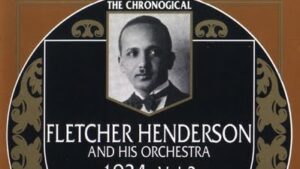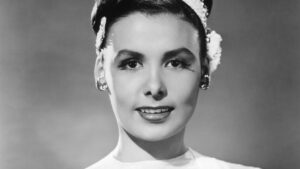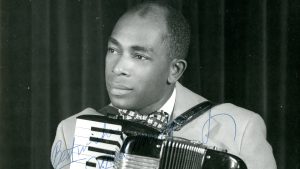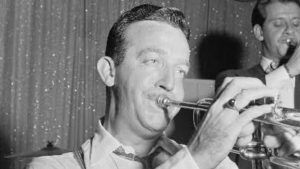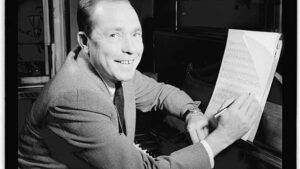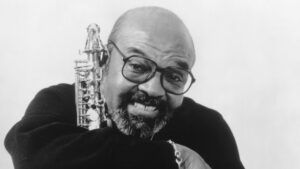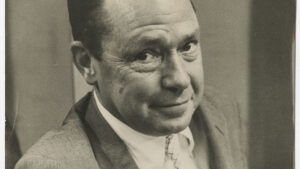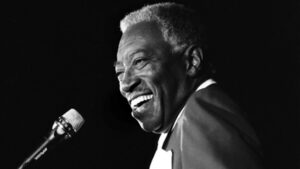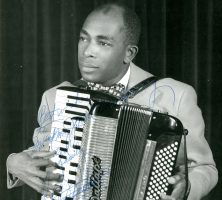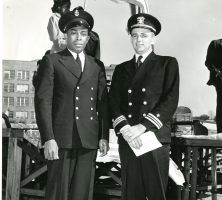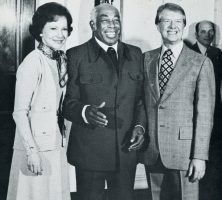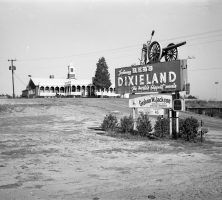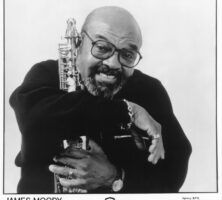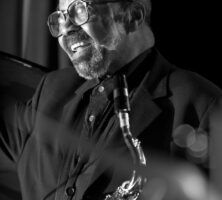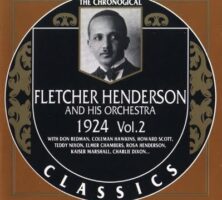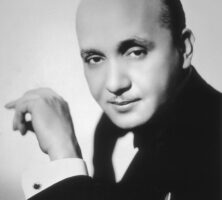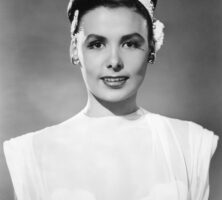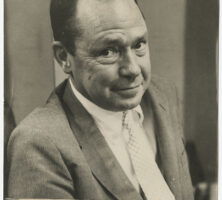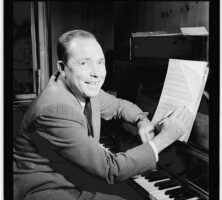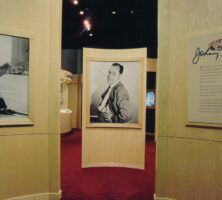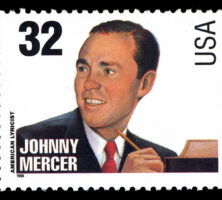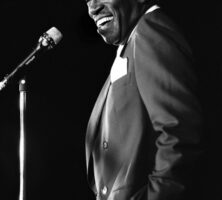The New Georgia Encyclopedia is supported by funding from A More Perfect Union, a special initiative of the National Endowment for the Humanities.
Graham Jackson Sr. began his musical career with the jazz group the Seminole Syncopaters in Atlanta. He performed for Franklin D. Roosevelt over twenty-four times during his career, and at the president's funeral in 1945.
Courtesy of Auburn Avenue Research Library, Graham Washington Jackson, Sr. papers.
The New Georgia Encyclopedia does not hold the copyright for this media resource and can neither grant nor deny permission to republish or reproduce the image online or in print. All requests for permission to publish or reproduce the resource must be submitted to the rights holder.
As part of a campaign to expand the roles for African Americans during World War II, Jackson enlisted and served in the Navy from 1942 until the war's end, in 1945.
Courtesy of Auburn Avenue Research Library, Graham Washington Jackson, Sr. papers.
The New Georgia Encyclopedia does not hold the copyright for this media resource and can neither grant nor deny permission to republish or reproduce the image online or in print. All requests for permission to publish or reproduce the resource must be submitted to the rights holder.
Known as "The Ambassador of Good Will," Graham Jackson Sr. was invited to perform for U.S. presidents throughout his career. Jimmy Carter was the last president for whom Jackson performed.
Courtesy of Auburn Avenue Research Library, Graham Washington Jackson, Sr. papers.
The New Georgia Encyclopedia does not hold the copyright for this media resource and can neither grant nor deny permission to republish or reproduce the image online or in print. All requests for permission to publish or reproduce the resource must be submitted to the rights holder.
Graham Jackson Sr. performed nightly at Johnny Reb's Dixieland canteen and restaurant in Atlanta until 1967.
Courtesy of Special Collections & Archives, Georgia State University Library, Tracy O'Neal Photographic Collection, #N10-23_a.
The New Georgia Encyclopedia does not hold the copyright for this media resource and can neither grant nor deny permission to republish or reproduce the image online or in print. Requests for permission to publish or reproduce the resource should be submitted to Special Collections and Archives at Georgia State University.
Savannah-born James Moody was one of the early innovators of bebop. The jazz saxophonist, composer, and band leader recorded more than fifty albums.
The New Georgia Encyclopedia does not hold the copyright for this media resource and can neither grant nor deny permission to republish or reproduce the image online or in print. All requests for permission to publish or reproduce the resource must be submitted to the rights holder.
The New Georgia Encyclopedia does not hold the copyright for this media resource and can neither grant nor deny permission to republish or reproduce the image online or in print. All requests for permission to publish or reproduce the resource must be submitted to the rights holder.
Jazz musician James Moody, a native of Savannah, performs in 2007 at his eighty-second birthday celebration, held in New York City.
Photograph by Ned Radinsky. Courtesy of rockymountainjazz.com
The New Georgia Encyclopedia does not hold the copyright for this media resource and can neither grant nor deny permission to republish or reproduce the image online or in print. All requests for permission to publish or reproduce the resource must be submitted to the rights holder.
Fletcher Henderson, a native of Randolph County, formed the first big band orchestra around 1920 in New York City. In 1921 Fletcher's orchestra began making records, and the group played at the Roseland Ballroom in New York for the rest of the decade.
The New Georgia Encyclopedia does not hold the copyright for this media resource and can neither grant nor deny permission to republish or reproduce the image online or in print. All requests for permission to publish or reproduce the resource must be submitted to the rights holder.
Fletcher Henderson, an accomplished pianist and native of Cuthbert, is credited with forming the first big band orchestra in New York City during the 1920s. His musical contributions laid the foundation for swing music.
Image from Wikimedia
The New Georgia Encyclopedia does not hold the copyright for this media resource and can neither grant nor deny permission to republish or reproduce the image online or in print. All requests for permission to publish or reproduce the resource must be submitted to the rights holder.
The New Georgia Encyclopedia does not hold the copyright for this media resource and can neither grant nor deny permission to republish or reproduce the image online or in print. All requests for permission to publish or reproduce the resource must be submitted to the rights holder.
Lena Horne, an acclaimed entertainer and civil rights activist, is pictured in a 1946 publicity still for Till the Clouds Roll By. Born in Brooklyn, New York, Horne spent part of her childhood in both Fort Valley and Atlanta before beginning her career in New York at the age of sixteen. In 1984 she received the Kennedy Center Honor for lifetime achievement in the performing arts.
Image from Wikimedia
The New Georgia Encyclopedia does not hold the copyright for this media resource and can neither grant nor deny permission to republish or reproduce the image online or in print. All requests for permission to publish or reproduce the resource must be submitted to the rights holder.
Harry James, a renowned swing trumpet player during the 1930s and 1940s, rehearses for the Coca-Cola radio show in New York City around 1946. James was born in Albany to traveling circus performers and began playing the trumpet as a child.
Courtesy of Library of Congress, Music Division, William P. Gottlieb/Ira and Leonore S. Gershwin Fund Collection.
The New Georgia Encyclopedia does not hold the copyright for this media resource and can neither grant nor deny permission to republish or reproduce the image online or in print. All requests for permission to publish or reproduce the resource must be submitted to the rights holder.
The New Georgia Encyclopedia does not hold the copyright for this media resource and can neither grant nor deny permission to republish or reproduce the image online or in print. All requests for permission to publish or reproduce the resource must be submitted to the rights holder.
Pictured in New York circa 1947, Harry James was a renowned trumpet player and band leader. The Albany native played with some of the most prominent performers of the swing era, including Benny Goodman and Connie Haines.
Courtesy of Library of Congress, Music Division, William P. Gottlieb/Ira and Leonore S. Gershwin Fund Collection.
The New Georgia Encyclopedia does not hold the copyright for this media resource and can neither grant nor deny permission to republish or reproduce the image online or in print. All requests for permission to publish or reproduce the resource must be submitted to the rights holder.
Johnny Mercer, a Savannah native, wrote numerous popular songs during the swing era, many of which are now considered classics. A vocalist as well as a lyricist, Mercer often sang with Benny Goodman.
The New Georgia Encyclopedia does not hold the copyright for this media resource and can neither grant nor deny permission to republish or reproduce the image online or in print. Requests for permission to publish or reproduce the resource should be submitted to the Hargrett Manuscript and Rare Book Library at the University of Georgia.
Savannahian Johnny Mercer was one of America's most popular and successful songwriters of the twentieth century. Mercer penned lyrics to more than 1,000 songs, received nineteen Academy Award nominations, wrote music for a number of Broadway shows, and cofounded Capitol Records.
Courtesy of Library of Congress, Music Division, William P. Gottlieb/Ira and Leonore S. Gershwin Fund Collection.
The New Georgia Encyclopedia does not hold the copyright for this media resource and can neither grant nor deny permission to republish or reproduce the image online or in print. All requests for permission to publish or reproduce the resource must be submitted to the rights holder.
The Johnny Mercer Collection in the Special Collections and Archives Department at Georgia State University is home to a large collection of the songwriter's personal papers and effects, including correspondence, sound recordings, sheet music, and lyrics.
The New Georgia Encyclopedia does not hold the copyright for this media resource and can neither grant nor deny permission to republish or reproduce the image online or in print. Requests for permission to publish or reproduce the resource should be submitted to Special Collections and Archives at Georgia State University.
Savannah-born songwriter Johnny Mercer, commemorated on this 1996 first-class postage stamp, is best known for his Academy Award-winning song "Moon River."
Courtesy of Smithsonian National Postal Museum
The New Georgia Encyclopedia does not hold the copyright for this media resource and can neither grant nor deny permission to republish or reproduce the image online or in print. All requests for permission to publish or reproduce the resource must be submitted to the rights holder.
Joe Williams is considered by many to be the quintessential male jazz vocalist. Best known for his smooth baritone delivery as the singer for Count Basie's band from 1954 to 1961, the Georgia native also sang with Coleman Hawkins, Lionel Hampton, and Earl Hines, and had a successful solo career.
Image from Brian McMillen
The New Georgia Encyclopedia does not hold the copyright for this media resource and can neither grant nor deny permission to republish or reproduce the image online or in print. All requests for permission to publish or reproduce the resource must be submitted to the rights holder.
